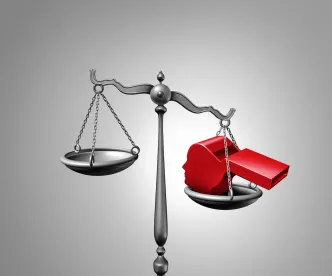On June 15, 2020, Senator Kamala Harris and Representatives Jackie Speier and Jamie Raskin introduced the COVID-19 Whistleblower Protection Act (the “Act”), which seeks to provide protections for employees who blow the whistle on employers who misuse federal funds received through various measures enacted by Congress aimed at mitigating the impact of the coronavirus pandemic. (The text of the proposed bill can be found here.) Many of the whistleblower protections in the Act echo those contained in the American Recovery and Reinvestment Act of 2009 – the economic stimulus bill signed by President Obama in the wake of the Great Recession. (Our article on that bill can be found here).
Retaliation
If passed, the Act would prohibit employers from taking reprisals against protected individuals for “disclosing, being perceived as disclosing, or preparing to disclose . . . to an officer or entity [designated under the statute] information that the protected individual reasonably believes is evidence of misconduct that violates, obstructs, or undermines any statute, rule, or regulation with respect to any Coronavirus pandemic-related program, project, or activity,” including, among other things, gross mismanagement of agency contracts, grants, and covered funds, dangers to public health or safety, abuse of authority, and violations of laws, rules, or regulations.
In addition, the Act would prohibit employers from retaliating against any protected individual who refuses to obey orders that the individual “reasonably believes would require that individual to violate a statute, rule, or regulation with respect to any Coronavirus pandemic-related program, project, or activity.” Under the Act, a “reprisal” is defined as “an action (or, as applicable, inaction) that is discharging, demoting, blacklisting, or acting or failing to take an action in a manner prejudicial against, or otherwise discriminating against in any way (including in the hiring process and including by the threat of any such action or inaction) a protected individual.”
The Act’s protections also extend to individuals who assist in disclosing or are preparing to assist in disclosing such information as well as employees who make such disclosures in the ordinary course of their duties. Notably, the bill takes an expansive approach with respect to the types of individuals it protects, defining a “protected individual” as an employee, former employee, or applicant for employment. Moreover, the bill defines an employee as “an individual performing services on behalf of an employer, including any individual working for an employer under a contract with such employer (including a contractor, subcontractor, or agent of an employer).”
The Act defines the phrase “Coronavirus pandemic-related program, project, or activity” as a “program, project or activity of the executive branch . . . authorized or carried out using amounts made available under an Act to respond to or to provide aid or assistance to address, relief from, or funding to address the outbreak of COVID-19 that is enacted before, on, or after the date of enactment of this Act.” The phrase expressly includes programs, projects, or activities that are funded by any of the following: (i) the Paycheck Protection Program and Health Care Enhancement Act; (ii) the CARES Act; (iii) the Families First Coronavirus Response Act; or (iv) the Coronavirus Preparedness and Response Supplemental Appropriations Act, 2020.
Officers and entities to whom individuals can report include, but are not limited to, the Pandemic Response Accountability Committee, an inspector general, including the Special Inspector General for Pandemic Relief, the Congressional Oversight Commission, the Comptroller General of the United States, a member of Congress, and a congressional committee.
Administrative and Judicial Relief
The Act provides that protected individuals who believe they have been subjected to a reprisal may submit a complaint to the U.S. Department of Labor within 3 years after learning of the alleged reprisal. The employer may then file an answer to the complaint within 60 days. In evaluating the claims brought by a protected individual, the Secretary of Labor must determine whether the individual’s disclosure or protected activity was a contributing factor in the alleged reprisal. If the Secretary of Labor does not issue a final decision within 180 days of the filing of the complaint, the individual may bring an action in federal court and is entitled to a jury trial.
Available relief includes reinstatement, compensatory damages, liquidated damages for double back pay, and attorneys’ fees and costs.
The Act also provides that pre-dispute arbitration agreements requiring arbitration of disputes under the Act will not be valid or enforceable.
Implications for Employers
This bill comes as no surprise, as whistleblower protections have proliferated in connection with a broad range of legislation. Although the bill is only at the earliest stages of the legislative process, the right to a jury trial and availability of substantial damages raise significant risks for employers if the bill is signed into law.






 />i
/>i
